In ‘Free Solo,’ Alex Honnold is on display as climber and boyfriend
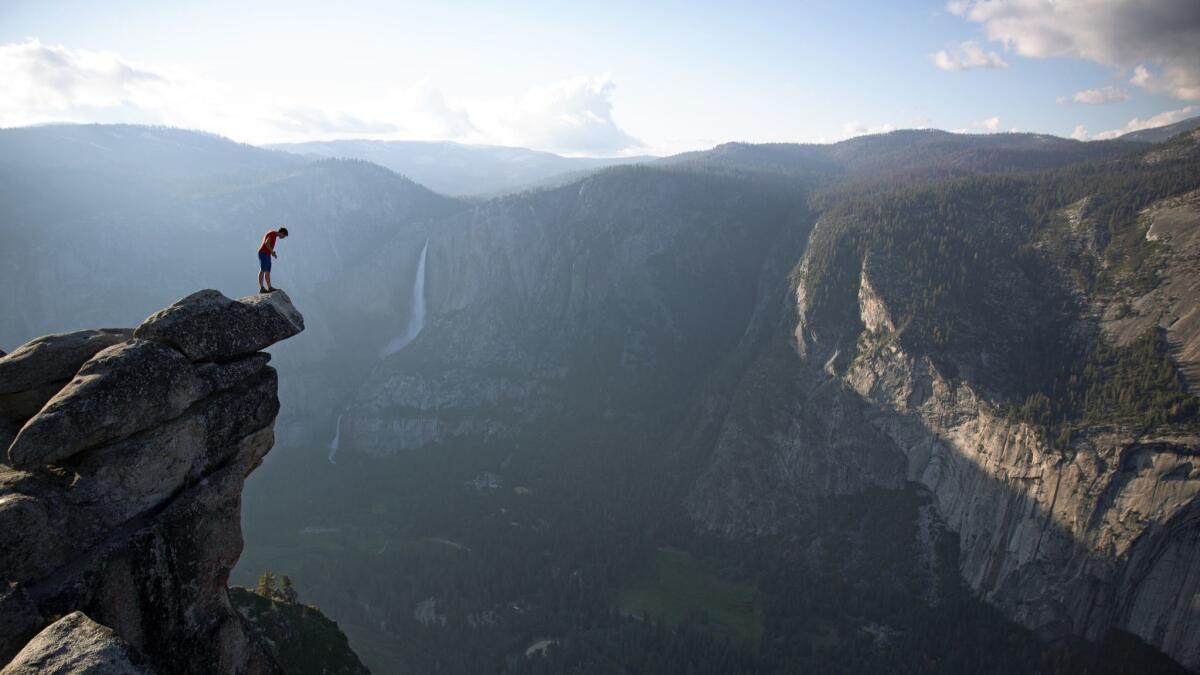
- Share via
Alex Honnold was preparing for the biggest climb of his life when he started to fall for her.
She’d come up to him after one of his book tour stops, this buoyant spirit who seemed different from anyone he was meeting on dating apps. She was outdoorsy too, the kind of young woman who wouldn’t be put off by the fact he lived in a Dodge Ram ProMaster van.
So even though Honnold was readying himself for a death-defying ascent — trying to become the first to scale Yosemite’s El Capitan, a 3,000-foot rock wall, without ropes — he invited Sanni McCandless, his new girlfriend, to move into his van.
Adjusting to life inside a cramped vehicle would be challenge enough for any fledgling couple. But shortly after McCandless quit her job in Seattle to join Honnold on the road, she learned their courtship would also be filmed: Honnold had just agreed to be the subject of a documentary about his quest to free solo El Capitan.
“At first, I really wasn’t sure what my role in it was gonna be,” McCandless, now 26, recalled. “It was the beginning of our relationship, so I think my concern was: ‘I wonder if this is gonna put weird pressure on us as a couple.’ We were still getting to know each other.”
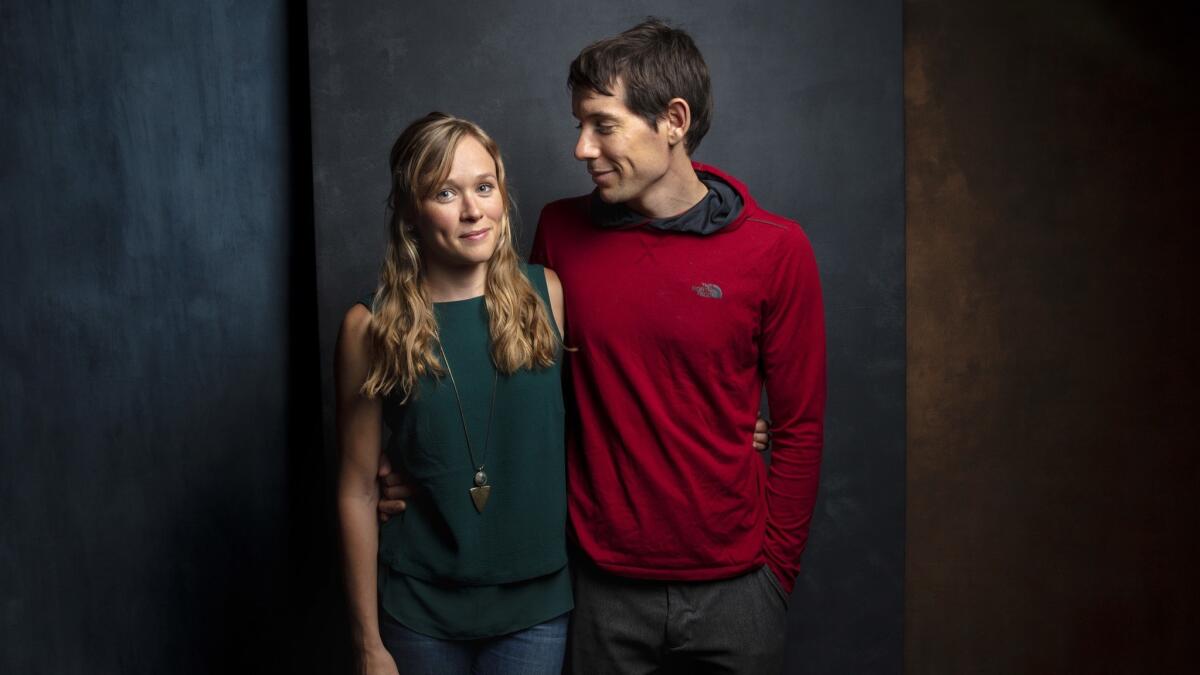
It helped, though, that “Free Solo” would be shot by Jimmy Chin and Elizabeth Chai Vasarhelyi, a husband-and-wife filmmaking duo whose relationship, in many ways, mirrored that of their film’s young lovebirds. Chin was one of Honnold’s longtime climbing buddies — the two met as members of North Face’s athlete team — who himself had traversed Everest, Annapurna and Meru. While Chin made his name documenting his risky adventures for National Geographic, Vasarhelyi began her career working for ABC news anchor Peter Jennings while she was a student at Princeton. The films she made were set against the backdrop of global turmoil — following Kosovo twentysomethings surviving amid the Bosnian conflict or a Senegalese pop star whose Islamic faith stirred cultural debate in Africa.
In other words: Vasarhelyi isn’t into climbing. She and Chin, who have a young son and daughter, split their time between Wyoming and New York to accommodate their varying lifestyles. Chin doesn’t like the city and primarily lives in Jackson Hole, where he can be close to nature; Vasarhelyi, who grew up on the Upper East Side, still keeps the Instagram handle “mochinyc” despite all the time she spends with her family out in the Rockies.
It’s this very dichotomy that makes “Free Solo” — a National Geographic film that opened in theaters Friday — work so well.
“Part of the thing about me working with Alex is that I’m very, very close to it, so I have a deep understanding of the climbing ethos, the culture, how he approaches it, his capacity to make assessments and risk,” Chin explained. “But Chai has a totally objective view of it.”
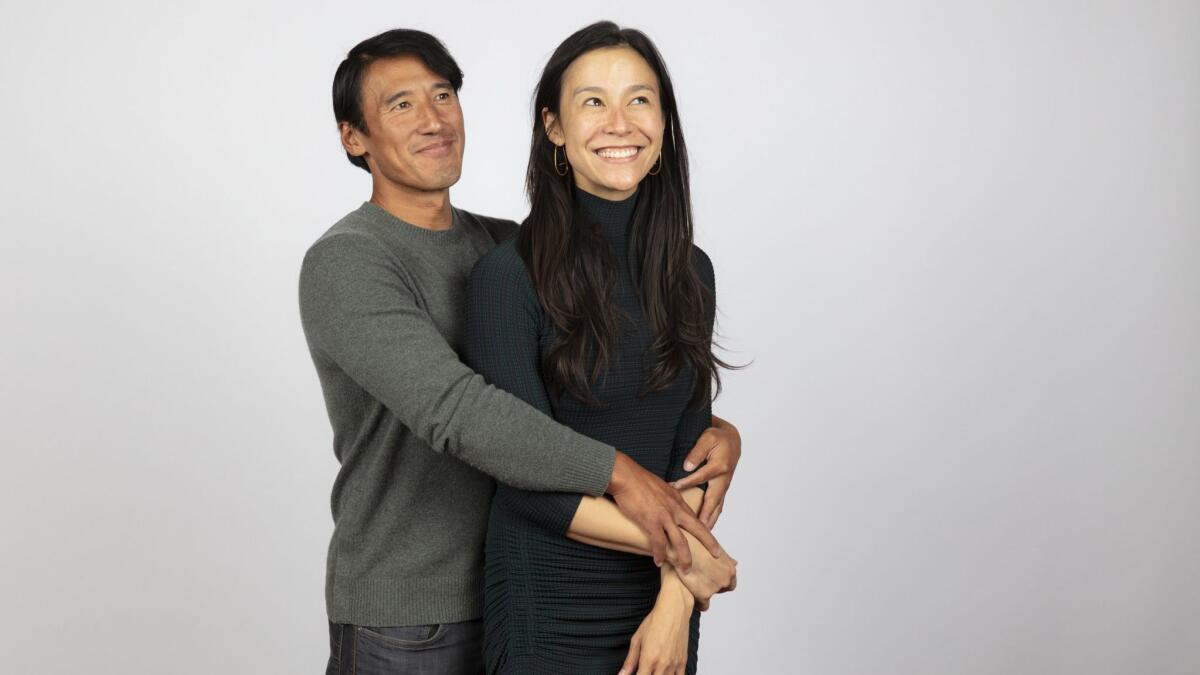
He was sitting next to his wife with Honnold and McCandless in a hotel room earlier this month, a couple of days after “Free Solo” screened at the Toronto International Film Festival. Even though the group had already visited an indoor climbing gym in the city, Honnold seemed restless, spinning on an office chair.
Vasarhelyi’s main goal with the documentary, she admitted, was trying to understand what made the 33-year-old tick. When she was trying to measure whether she and Chin could make a film with “more than just awesome rock climbing,” she read Honnold’s 2015 book, “Alone on the Wall.” In it, he describes how as a kid, it was easier for him to climb without a partner — meaning without a rope — than to ask someone to be his partner.
“And I feel we all have that,” Vasarhelyi said. “We have something in our lives like that we work through. The idea that this incredible feat could somehow communicate that anyone out there could work through their fears was moving to me.”
Still, the directors had concerns about filming Honnold’s El Cap ascent. It took them a while to even take him seriously because “it was just too far out there — even for me — and I’ve been shooting people who are the best in their sport for 20 years,” said Chin.
“I mean, honestly, none of my friends were ever like, ‘So when are you soloing El Cap?’” Honnold said. “Because it was just like, ‘That’s completely outrageous.’ Nobody wanted it to happen.”
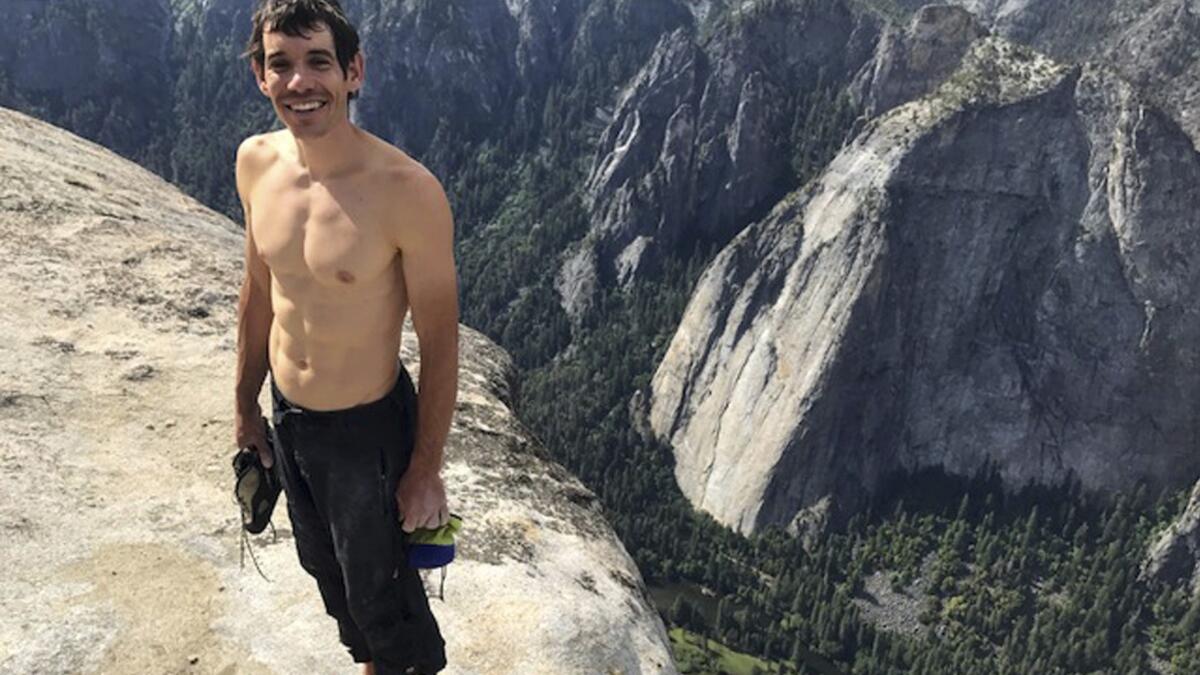
Once it became clear that Honnold truly did intend to climb the wall with just his hands and feet, the filmmakers paused. They put the project on hold for a couple of months to mull over the ethical quandaries: What if the pressure of being filmed somehow affected his climb? What if he fell to his death and their cameras captured the tragedy?
And what about McCandless? Those closest to Honnold quietly worried that his budding romance would distract him from his mission.
“A romantic relationship inevitably takes away the armor, and he needs to be focused,” Chin said. As a climber, he added, “part of me was in that space.”
“We all were,” added Vasarhelyi.
“Except for me!” McCandless said with faux enthusiasm. “I mean, imagine you’re waking up to take on the most challenging physical experience of your life. If you wake up alone in a cold, dark van, you’re like, ‘I’ve gotta get out there and ascend and be rad!’ If you wake up next to a partner and you’re cozy, you’re happy — why go? Why put your life at risk?”
“I think in a lot of ways,” she continued, “my role was to say over and over again: ‘I think you can have it all. I think you can be in this relationship and have a lot of joy and love in your life and you can also go do rad things and you can also go be a badass athlete.’”
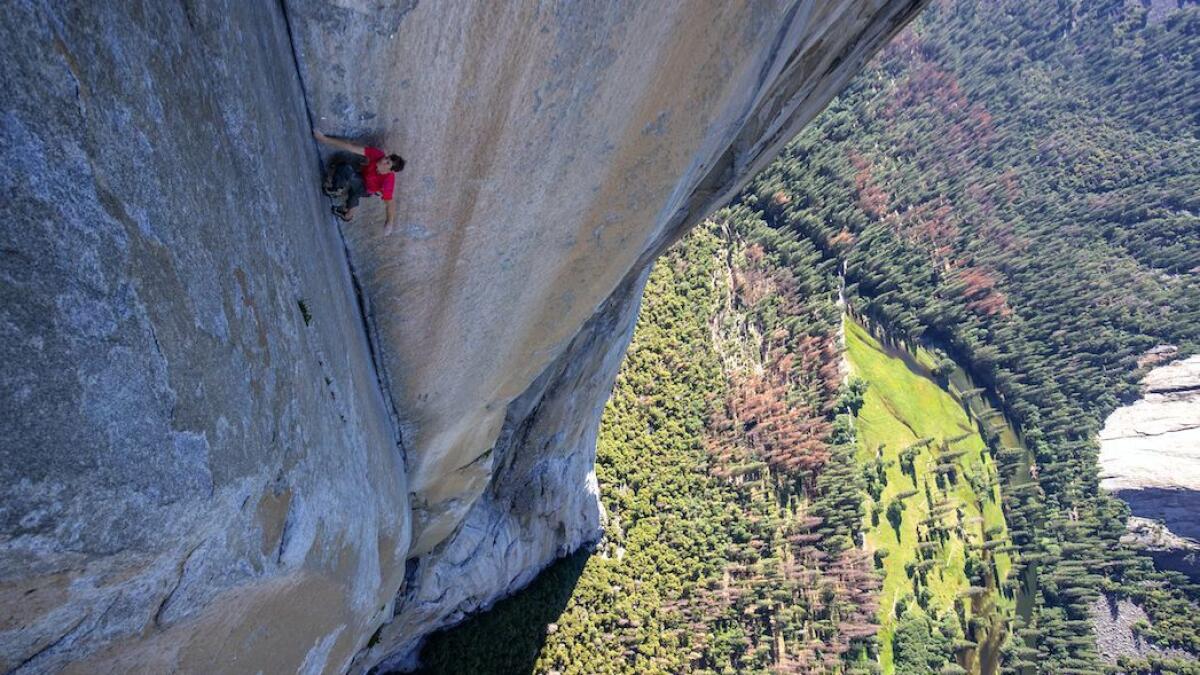
But for a while, even Honnold feared his girlfriend was impacting his focus. While training for El Cap, he brought McCandless along for help and twice ended up suffering injuries. In the film, he says he considered breaking up with her as a result of the accidents.
“I never really blamed her,” he said in Canada, walking back his statement. “I wanted to blame her, but honestly, it’s more on me. Basically, I slipped, I fell, I hurt my ankle — she was there and she was belaying, but it’s not anything she did. It was just sort of unfortunate.”
“Alex and I had all those conversations,” McCandless said. “I was very much committed to learning: What did I do wrong? Could I have done something differently? How am I affecting you, and how are you affecting me?”
Sensing the tension in the room, Vasarhelyi chimed in.
“I think what the film was trying to say,” she offered, “was that we were questioning Alex’s judgment for training with a novice when he’s training for this big objective. I think the real issue was to sleep with us all day and sleep with someone else all night is just exhausting. It was all so intense. To fall in love with Sanni in front of the cameras while you’re working on the biggest dream of your life while this big production is around you — it was a lot.”
It was a lot for Honnold, sure, but also for McCandless. “Free Solo” doesn’t always paint the climber as the easiest person to date. He’s blunt — often to the point of discomfort — and withholding with his feelings. He doesn’t like “scheduled fun,” like birthdays or parties, because, he says, “I like having fun when I have fun. I don’t like being told to have fun.”
“I in no way feel obligated to maximize lifetime.”
— Alex Honnold
In the film, when he and McCandless finally purchase a place to live together outside the van — a home in Nevada — she eagerly takes measurements, excited to decorate the place; he stares on blankly. When she asks Honnold if having her in his life changes his mindset about risk-taking, he replies that he appreciates her concern, but “I in no way feel obligated to maximize lifetime.”
And on June 3, 2017, the day Honnold became the first person to solo El Capitan, McCandless wasn’t there. She’d left hours before, opting to drive back to Nevada because she knew he needed his space.
“It’s really hard for me to grasp why he wants this,” she says on camera through tears, miles down the road. “Why do you want this? It’s a totally crazy goal.”
“I mean, Sanni climbed her own mountain that day,” Vasarhelyi said in Toronto. “To be able to leave that day must have been the hardest thing ever.”
The filmmaker — who said she’s grateful to have a creative outlet when she gets worried about her own husband’s risk-taking — said she often related to McCandless. Despite their 13-year age gap, Vasarhelyi said she often felt the urge to give McCandless advice, but resisted because of the professional boundaries.
“Sanni is remarkable,” the director said with a smile. “She articulates her feelings and she also stands up for who she is quite honestly, and that was a wonderful foil for Alex.”
“Who has none of those things,” Honnold interjected.
“Well, no!” Vasarhelyi insisted. “You were totally candid about your feelings, and that’s why we have those crazy scenes, which are incredibly painful and difficult, but they’re honest.”
And which is why, after Honnold climbs El Capitan rope-free in 3 hours and 56 minutes, it’s almost more of a relief to watch him call McCandless and hear him say ‘I love you’ than it is to see him reach the top of the wall. Those three little words are an awkward point of contention between the couple throughout “Free Solo.” As McCandless explains: “I tell Alex that I love him all the time, and he shows me that he loves me all the time.”
In fact, the first time Chin watched the footage from the El Cap shoot, he was so stunned to hear his friend utter the words aloud that he had to replay the clip.
“In the 10 years I’ve known Alex, I’ve certainly never heard him say ‘I love you’ to anybody,” said Chin. “So when we saw the footage, I was like, ‘He said what?’ I couldn’t believe it.”
“Yeah, I keep it discreet,” Honnold said with a coy grin.
“Discuss it away. It’s just my heart on the line,” McCandless said sarcastically. “No, Alex was saying ‘I love you’ the whole time.”
“Well, like, from time to time,” Honnold said. “You know, just enough. I think of it as watering a desert rose, you know — it’s parched and then just one drop of water.”
“You’re digging deeper. Just stop,” Vasarhelyi said, shaking her head.
“Yeah, that’s not helping at all,” McCandless agreed.
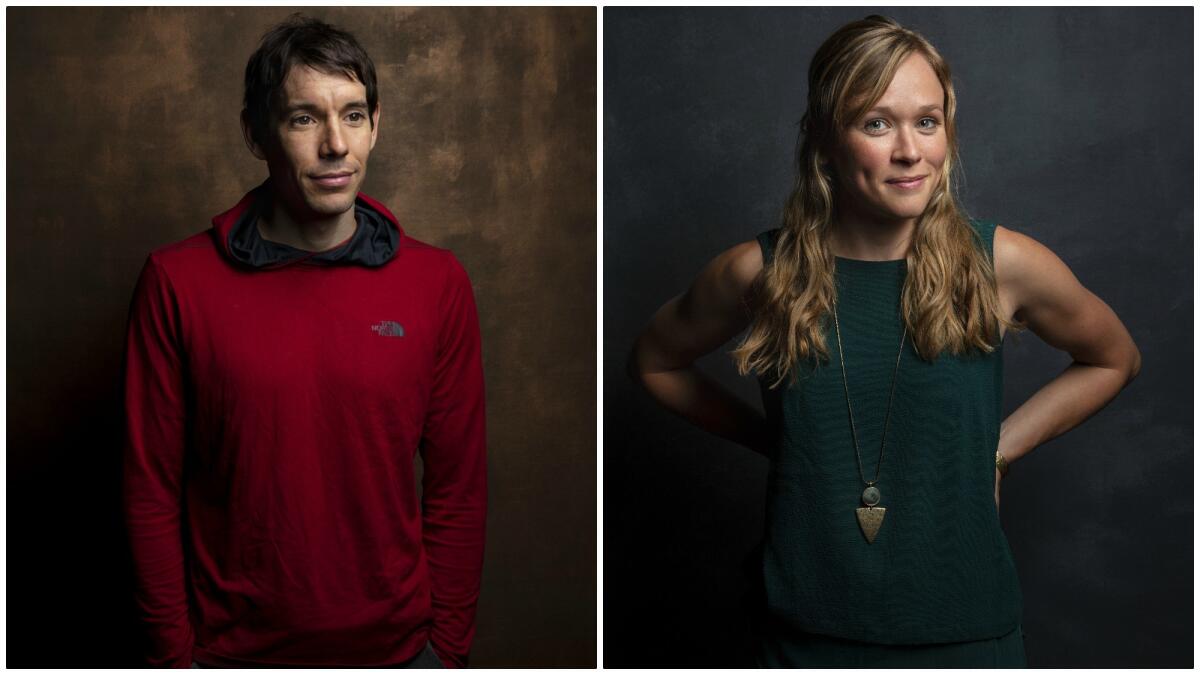
Asked if going through such vulnerable moments on camera ultimately strengthened their relationship, McCandless initially gave a forceful “no.” But Honnold said he disagreed. Sure, the documentary added stress, but he found it helpful to articulate his feelings in interviews in ways he might not otherwise.
“That’s true for him; that’s not true for me,” she clarified. “I talk about my feelings with a lot of different people, and I’m a very reflective person. So it wasn’t something new to have those conversations. But for Alex, maybe it was really good timing to have to process it more.”
But the question remains: A few years into his relationship with McCandless, does Honnold still prioritize climbing above all else?
“I mean, we’ll see, we’ll see,” he said, squirming a bit. “Maybe if we have a family someday or something, maybe I’ll value it totally differently. Maybe I’ll never find another soloing objective that I’m as passionate about. Maybe I’ll never solo anything meaningful again. We’ll just see.”
Follow me on Twitter @AmyKinLA
More to Read
Only good movies
Get the Indie Focus newsletter, Mark Olsen's weekly guide to the world of cinema.
You may occasionally receive promotional content from the Los Angeles Times.










